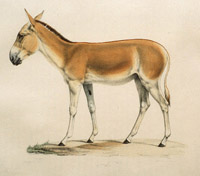
Erforschung biologischer Ressourcen der Mongolei / Exploration into the Biological Resources of Mongolia, ISSN 0440-1298
Date of this Version
2005
Document Type
Article
Citation
Erforschung biologischer Ressourcen der Mongolei (2005) 9: 453-460.
Ergebnisse der Mongolisch-Deutschen Biologischen Expeditionen seit 1962, Nr. 260.
Abstract
Physocephala pusilla Meigen (Diptera: Conopidae) was found to be a dangerous endoparasitoid of the alfalfa leafcutter bee Megachile rotundata F. (Hymenoptera: Megachilidae) in Mongolia. The conopid fly parasitizes adults and causes their early death. In 1989 and 1990, 16% and 15% respectively of the M. rotundata females were found dead in front of the bee shelter. However, the number of bees (females and males) dying in the field is unknown. These bees cause a contamination of the alfalfa fields due to an increase of the conopid population. Therefore, Ph. pusilla becomes a serious problem for the management of M. rotundata in Mongolia. The control of the conopid fly might be complicated due to the synchronization of their developmental cycles with that of the host and the contamination of the fields by perished parasitized bees. The discovery of a autochthony hyperparasite, Pteromalus conopidarum Bouček (Hymenoptera: Pteromalidae), in pupariums of the parasite opens the possibility of a biological pest control.
Included in
Asian Studies Commons, Behavior and Ethology Commons, Biodiversity Commons, Desert Ecology Commons, Environmental Sciences Commons, Nature and Society Relations Commons, Other Animal Sciences Commons, Other Ecology and Evolutionary Biology Commons, Population Biology Commons, Terrestrial and Aquatic Ecology Commons, Zoology Commons


Comments
Copyright 2005, Martin-Luther-Universität. Used by permission.